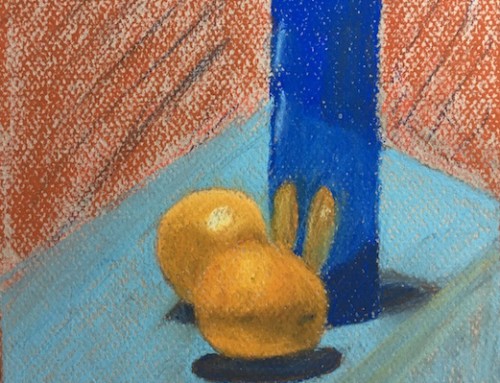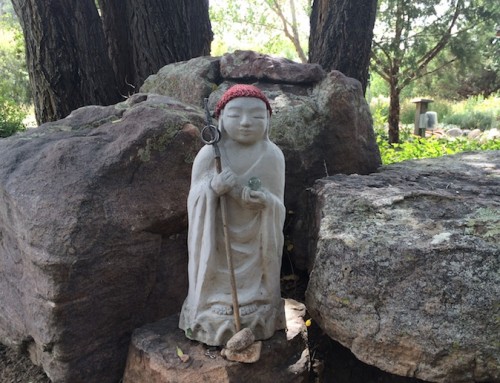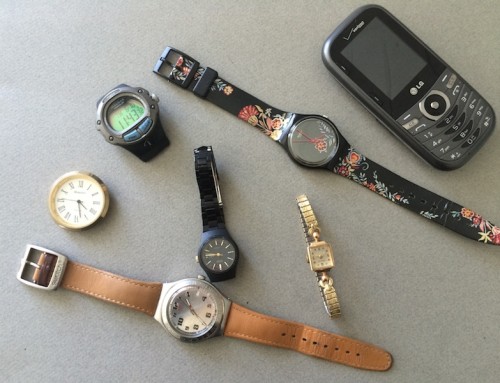For the last few weeks it has felt as if I know less and less each day, and much less than when I started the Buddhist Contemplative Care course. I’ve walked away from more than a few patients thinking that I didn’t do enough, didn’t say the right words, couldn’t relieve them of even a fraction of their suffering. Even thinking of it now as I write this, sitting in a tubful of hot water, it brings tears to my eyes: to witness people suffering, to be let in, to be afraid for them, to be with them—all of that right now feels like such an honor. While I’m with them I don’t think much, I just try to let myself be.
I cry now for my mother and family as she lies in a rehab after being moved back and forth to the hospital today, getting weaker from recent gall bladder surgery and almost ninety years of life. I see how my siblings (there are seven of them) want her to get better and to live more—she has become the conduit through which we all come together and perhaps they wonder as I do if we will drift apart when the glue of mother is gone. I want to instruct them, save them, relieve them of their suffering and I can’t. I have been so matter of fact about my mother’s condition and that she may be near the end, I sometimes wonder if there is something wrong with me, if I have no empathy, no compassion, no feelings for my mother’s impending death. As I sit here and weep I am grateful for the release of deep feelings. I probably would have got to them eventually, but am grateful they are here now.
One recent experience I had with a patient might have been a turning point and could have been the catalyst for why I felt so incompetent the rest of the month.
She was a patient in the Psych ward, and when we met she was sitting with an uneaten breakfast, but very chatty. She had an issue with weight loss, so I decided to leave her to her meal and return later for a visit. When I got back to her, she was steeped in anger. Someone had told her to wait for the floor to dry before leaving the dining room. They did not want her to slip and fall. She spewed vitriol, called people names, stereotyped the staff in a demeaning way. I tried to speak rationally to her, calm her anger, combat her ugly comments with reason. Of course, none of it worked. I should have just let her be angry! It was so hard to sit there and listen to her, but I see now that my comments could have further fueled her anger and there was no way I was going to convince her that what she was saying was insensitive, cruel and “wrong.”
Then there was a patient who had cancer and was very scared. He didn’t want to talk and said he was more interested in distracting himself from his issues. He did ask me about Buddhism, but once I started talking he wanted to be left alone. He wasn’t interested in prayer, meditation, relaxation, or the calming, meditative TV channel. He wanted me to go. I felt incompetent the rest of that day. I couldn’t find the right words, or entry in. I witnessed a lot of suffering and felt completely powerless.
Then there was another patient that a social worker asked me to visit even though he wasn’t in my assigned unit. His sister was there with him. He was weak, in serious condition and clearly distressed; I saw panic in his eyes when his sister said she would be returning home to another country the next week. I decided to try a relaxation/visualization exercise. Once I started speaking in a soft tone with some comforting words, the sister began to cry and left the room so I could be with him. I don’t know if I helped, but I felt like I wasn’t saying the right words. I couldn’t take away his pain, fear, and suffering. My heart was full, sad and bursting when I left. How much people carry!
There were also many highlights and gifts in my caregiving this past month. I introduced three young women in the Psych ward to meditation and they were grateful. I helped a patient—who was agitated and antsy, who couldn’t talk but was open to me being there, who was worried about her young child—with a relaxation meditation, a body scan and a light prayer. She totally relaxed and was ready for sleep when I left. It felt like I did something good.
Our assigned reading for the month was 9 Essays on Buddhism & the 12 Step Model of Recovery, which turned out to be a very helpful reading. I was given a copy of this some years ago, but I resisted reading it, thinking that my Buddhist take on the 12 steps was sufficient. So I was a bit surprised how the essay on the 7th step really opened up my heart and gave me a new perspective on no-self and humility: “beings who are joined to other beings.” Using the words connection, communion or community, as it suggested, in place of humility was almost a white light experience. I exaggerate here, but not too much.
For many years I did get the idea of service and how necessary it is for sobriety and a meaningful life. What opened up for me in reading this was the idea of vowing “…to be rid of whatever cripples our efforts to … be in communion with our fellows.”
I get the idea of being a worker among workers, a peer among peers and not holding any head higher than any other. But I have experienced a deeper realization of this lately. One of my learning goals is to be in communion with my peers, though I hadn’t actually phrased it that way until I read this essay; plus I wasn’t even sure who my peers were. But I’ve been making efforts to engage with the students in the Contemplative Care course and other Pastoral Care students who are in the hospital when I am, and to socialize and converse with the other students when we’re together even though my instinct is to isolate. It has been an uplifting and rewarding experience. It still doesn’t come easy, but I am committed to doing more of this. The result is that I feel more alike than different, I like myself and others more, and I gain confidence. But just like everything else that is worthwhile, it is a practice. So my New Year’s vow is to stay committed to being of service and to deepen and nurture the new connections that the course has delivered to me.
One thing I have learned this past month is that to be an effective caregiver I often have to do less rather than more. And so is it with words here in this blog. This has been a very full month of inner growth and learning for me and there is so much more to say, but if I add anything more, it will just be, in the immortal words of Shakespeare’s Hamlet: Words, words, words!






You sound like I feel…coincidentally. A long time friend, post-stroke & suffering from vascular dementia, just died yesterday. He was also a long time student of “A Course in Miracles” with a strong and lingering Irish Catholic background. My friend, Sr. Helen, and I said goodbye or “so-long” on Tuesday and I feel that shortly thereafter he told his God that he was ready, willing & able to leave. Even seeing it coming, I was still stunned. It’s such a delicate balance to strive for between a strong afterlife belief and the desire to remain present and helpful “in the flesh.” So we will go to the wake & the Mass and then keep on keeping on…and that, I think, is the point for me. God bless. And pls keep me informed with respect to your mom.
Thank you, Betty. No matter how much we may prepare for the end of our life or someone else’s, I think we’re never really ready. Will certainly keep you posted on mom. Love, Nancy
as always I am moved and edified by your recounting of your giving and being there for people. It’s touching and reassuring to know that you and others are providing many folks with a type of care that is selfless and priceless. your example leads me to be more mindful,compassionate, and humble. thanks also for how beautifully you write about it.
This post is gorgeous & made me tear up, Nancy. Thank you for it. I dream of studying with Roshi Joan Halifax, of joining a chapter of Threshold Choir. I need to stop dreaming & start doing.
xxx
Thank you, Christine. Sounds like you know just what to do. And to mix Zen quotes: time flies like an arrow, do not squander your life… xo Nancy